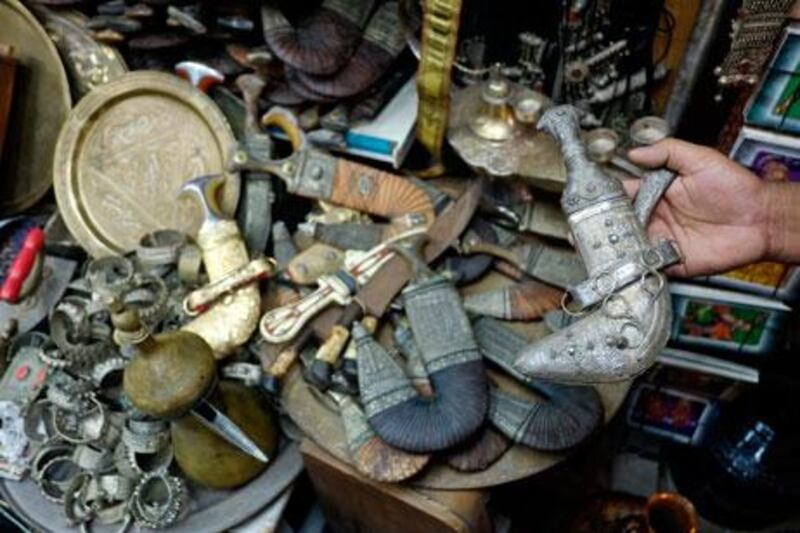SHARJAH // Police are planning a crackdown on shops and markets that sell swords or other bladed weapons after two violent gang clashes.
Three men were injured after they were attacked by a gang of six people carrying knives at Kalba on the east coast last week.
And, last month, six people were injured, one seriously, when they were attacked by a masked gang wielding knives in the Nakhelat neighbourhood in the early hours of the morning.
“One of the victims was severely injured and was admitted to the ICU at Al Qassimi Hospital for some days,” said Brigadier Abdullah Mubarak Al Dukhan, the deputy director general of Sharjah Police.
Brig Al Dukhan said it was regrettable that crimes involving knives were happening in the emirate and said police were planning a campaign this summer against markets and shops that sold swords and knives to young people.
Rashid Majid Al Omran, the Sharjah public prosecutor, said prosecutors were due to meet police to discuss ways to deal with cases where people, particularly youths, were caught carrying sharp tools and knives. He also urged parents to make sure their children do not carry weapons.
Saeed Mubarak, a Sharjah-based lawyer, said the absence of laws banning the sale of bladed weapons, or making it illegal to carry them, only added to the number of attacks.
“Authorities should come together to make legislations that criminalise anyone carrying sharp tools and knives,” he said.
He added that knives were easily accessible to young people and incidents tended to increase during the summer as young people had more free time and ended up getting into trouble and fighting.
Stabbings, sometimes fatal, are not uncommon in Sharjah, or elsewhere in the UAE.
In a high-profile case in 2009, the footballer, Fayyez Juma, was convicted of fatally stabbing a friend during a brawl and sentenced to death.
The verdict was later commuted by the appeals court to one year in jail and a Dh10,000 fine.
After the attack of Mohammed Ebrahim, a 21-year-old Emirati bank employee who was assaulted by six people armed with axes and butcher’s knives as he met a friend outside his house in Al Quoz last year, Lt Gen Dahi Khalfan Tamim, Dubai’s police chief, said there was a need for a law banning knives.
“A law criminalising the possession for bladed weapons is a must for solving the problem.”
Dr Zaki Al Muzakki, the head of the emergency and ambulance department at Al Qassimi hospital in Sharjah, said stabbing victims are always treated quickly as a priority.
“The first thing we always do is to try to stop the bleeding, check if the breathing is fine and ensure the patient’s stability,” he said. “After that we can then decide on any other specialised testing or treatment, whether to do an X-ray and confirm the severity of the injury or take the patient to the operation room and do a quick surgery.”
Even a slash with a knife to any part of the body can easily cause severe injuries, he said. “But once they injure some delicate body parts like the eyes, head or veins in the neck, the effects would be severe.”
Dr Al Muzakki said there was an urgent need to create more awareness, especially among young people, about the consequences of carrying and using knives.
[ ykakande@thenational.ae ]






